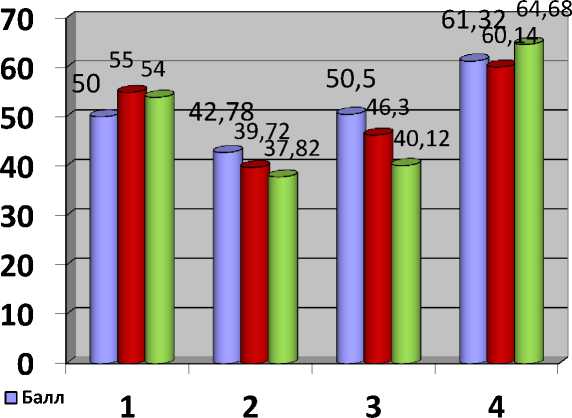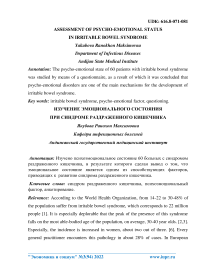Assessment of psycho-emotional status in irritable Bowel syndrome
Автор: Yakubova R.M.
Журнал: Экономика и социум @ekonomika-socium
Рубрика: Основной раздел
Статья в выпуске: 3-1 (94), 2022 года.
Бесплатный доступ
The psycho-emotional state of 60 patients with irritable bowel syndrome was studied by means of a questionnaire, as a result of which it was concluded that psycho-emotional disorders are one of the main mechanisms for the development of irritable bowel syndrome.
Irritable bowel syndrome, psychoemotional factor, questioning
Короткий адрес: https://sciup.org/140291302
IDR: 140291302 | УДК: 616.8-071-081
Текст научной статьи Assessment of psycho-emotional status in irritable Bowel syndrome
Relevance: According to the World Health Organization, from 14-22 to 30-48% of the population suffer from irritable bowel syndrome, which corresponds to 22 million people [1]. It is especially deplorable that the peak of the presence of this syndrome falls on the most able-bodied age of the population, on average, 30-40 year olds. [2,3]. Especially, the incidence is increased in women, about two out of three. [6]. Every general practitioner encounters this pathology in about 28% of cases. In European countries, this syndrome occurs in 3-22% of the population [1, 3].The psychoemotional state in patients with irritable bowel syndrome has been studied for a long time, but exhaustive data on its influence on the pathogenesis of the development of the syndrome are not enough today.
Purpose: To study the vegetovascular and psycho-emotional state in patients with irritable bowel syndrome.
Materials and Methods: 60 male and female people with established irritable bowel syndrome were examined. The psycho-emotional state was assessed by the questionnaire method using the SAN questionnaire. [4]
Results of the study: During the initial survey of 60 people, 35 people were treated with traditional treatment without the addition of drugs that affect the vegetovascular system, while in the second group, in addition to traditional treatment, sedatives were added.
When using the SAN questionnaire to assess the psycho-emotional state of patients with irritable bowel syndrome, it was found that in the first group after treatment without the use of sedatives, asthenia was observed in more than half of the group, while in the second group after treatment with sedatives, asthenia was observed in 2 patients, and the rest were not observed. After 15 days of treatment, the survey was re-conducted and the following results were obtained, shown in diagram № 1
Diagram № 1 Results of the “SAN” test before and after treatment in patients with irritable bowel syndrome.

1. Average degree. 2 before treatment. 3-after traditional treatment. 4-after treatment with the addition of sedatives as well.
As we can see, according to the diagram, before treatment, the psycho-emotional state of patients with irritable bowel syndrome according to the SAN questionnaire averaged 42.78 points. After treatment, it averaged 50.5 points, while when sedatives were added to the treatment program, this figure was 61.32 points.
The activity index before treatment, if it averaged 39.72 points, after the application of traditional treatment, it amounted to 46.3 points. When sedatives were added to the traditional treatment, the indicator was 60.14 points.
The mood score was 37.82 points before treatment, while after conventional treatment it was 40.12 points. After adding sedatives to conventional treatment, the mood score was 64.68.
Conclusions: Thus, according to the results of our study, it is clear that in 86% of patients with irritable bowel syndrome there is a fact of a stressful state in the form of anxiety, asthenia, mood changes, psychoemotional disorders. There was also a significant difference in treatment with and without sedatives, in which in the treatment regimen with the use of traditional treatment and sedatives in combination, the result improved by 2 times, which is important and improves both the patient's well-being and shortens the period
Used Books:
-
1. Ивашкин В.Т., Шептулин А.А. Избранные лекции по гастроэнтерологии. — М.: Медпресс-информ, 2002. — С. 85.
-
2. Маев И.В., Черемушкин С.В., Лебедева Е.Г. Синдром раздраженной кишки. Российский журнал гастроэнтерологии, гепатологии, колопроктологии. Том X 2000, №2.
-
3. Парфенов А. И., Ручкина И. Н. Распространенность хронических заболеваний толстой кишки среди рабочих и служащих промышленного предприятия // Рос.журн. гастро-энтерол. гепатол. колопроктол. 1993. Т. 2, № 3. C. 58-62.
-
4. Румянцев В. Г. Синдром раздраженного кишечника: путь к Римским критериям III // Фарматека. 2008. № 10. C. 16-23.
-
5. Ford A. C., Talley N. J., Schoenfeld P. S., Quigley E. M., Moayyedi P. Efficacy of antidepressants and psychological therapies in irritable bowel syndrome: systematic review and meta-analysis // Gut. 2009, Mar; 58 (3): 367–378.
-
6. Heaton KW. Irritable bowel syndrome. Recent advances in gastroenterology 1992;9:49-62.
"Экономика и социум" №3(94) 2022
Список литературы Assessment of psycho-emotional status in irritable Bowel syndrome
- Ивашкин В.Т., Шептулин А.А. Избранные лекции по гастроэнтерологии. - М.: Медпресс-информ, 2002. - С. 85.
- Маев И.В., Черемушкин С.В., Лебедева Е.Г. Синдром раздраженной кишки. Российский журнал гастроэнтерологии, гепатологии, колопроктологии. Том X 2000, №2.
- Парфенов А. И., Ручкина И. Н. Распространенность хронических заболеваний толстой кишки среди рабочих и служащих промышленного предприятия // Рос.журн. гастро-энтерол. гепатол. колопроктол. 1993. Т. 2, № 3. C. 58-62.
- Румянцев В. Г. Синдром раздраженного кишечника: путь к Римским критериям III // Фарматека. 2008. № 10. C. 16-23.
- EDN: JVADHJ
- Ford A. C., Talley N. J., Schoenfeld P. S., Quigley E. M., Moayyedi P. Efficacy of antidepressants and psychological therapies in irritable bowel syndrome: systematic review and meta-analysis // Gut. 2009, Mar, 58 (3): 367-378.
- Heaton KW. Irritable bowel syndrome. Recent advances in gastroenterology 1992.9:49-62.


